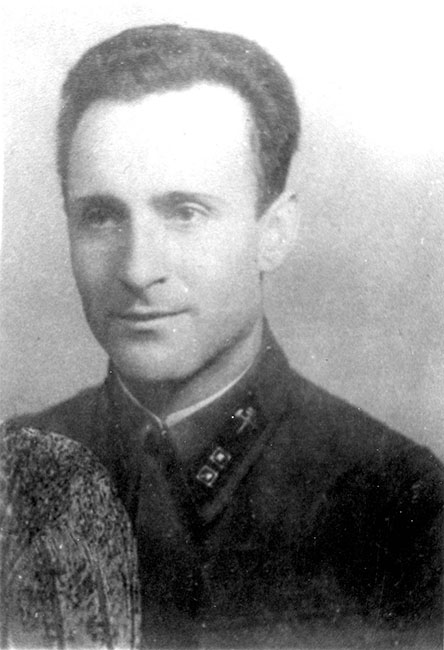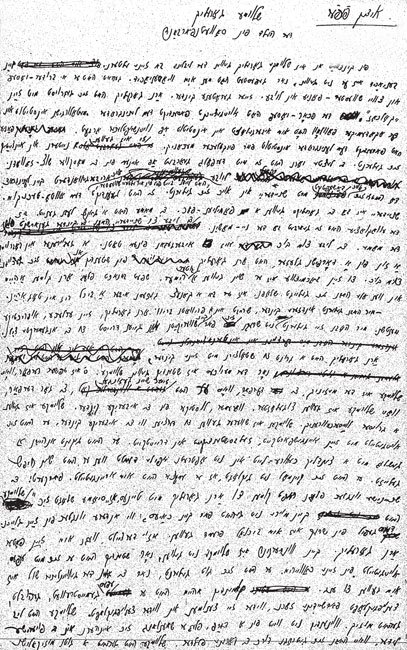Solomon (Shloyme) Gorelik was born in 1913 in Bobruisk, Belorussia. From childhood he had a keen interest in both technology and music. After graduating from a vocational school that trained students to work with metal, he moved to Leningrad. His sisters Fania and Liuba and older brother Iosif were already living there. The latter was a metallurgical engineer who worked in one of the city's research institutes. In 1931 Solomon was drafted and soon entered aviation school. However, in the following year he transferred to the Leningrad Technical Tank School. After graduating, he began serving as a mechanic in a tank unit near Leningrad.
During the Finnish campaign of 1939-1940 military mechanic Gorelik took tanks from Leningrad to the front and brought back damaged tanks to be repaired in Leningrad factories. Once the tank in which Gorelik was riding was hit and destroyed. Solomon escaped by a miracle.
In 1940, when the new T-34 Tank was just rolling off the assembly line for use by the Red Army, Gorelik was one of the first to command this tank. Soon thereafter he was reassigned to Lvov (Lwów, Lviv), where he served as assistant head of a course to train tank commanders.
He was at the front from the first days of the war, first as assistant commander of a company, then as head of military field workshops. His responsibilities included taking damaged tanks out of the battle zones, repairing them, and returning them to combat. On more than one occasion, after repairing a tank, military mechanic Gorelik immediately tried it out on the battlefield in place of the tank's commander.
In early October 1941 the 1st Tank Brigade, in which Solomon Gorelik was serving, had a role in a rare for Soviet forces at that time victory near Bododukhov and Shtepovka. Together with a cavalry unit and an infantry division his brigade succeeded in wiping out a German motorized division. During these battles the tank that was commanded by Military Mechanic 2nd class Gorelik destroyed 8 enemy artillery pieces, 3 machine-guns, and two German platoons.
In the second half of October 1941 Wehrmacht troops began an attack against Belgorod. In view of the critical situation at this time the command of the Southwest Front ordered that the advance of Hitler's army be halted at any price. In one battle on the outskirts of Belgorod the enemy concentrated fire on the tank commanded by Gorelik. One shell hit his tank but it continued forward at full speed while firing at the Germans. The combat continued until the tank was destroyed and its commander killed.
On December 27, 1941 the tank commander, Military Mechanic 2nd class Solomon Gorelik was posthumously awarded the title of Hero of the Soviet Union.
His older brother Iosif joined the Narodnoe opolchenie (a kind of national guard) in the summer of 1941 and was killed near Leningrad in October of that year, just 17 days before the death of Solomon Gorelik.
Itzik Fefer about Shloyme Gorelik
On December 5, 1942 Itzik Fefer published the article "Shloyme Gorelik, Hero of the Soviet Union" in the newspaper of the Jewish Anti-fascist Committee, Eynikayt. He wrote about the multi-talented Gorelik who was interested both in music and military technology. In his article Fefer attributed to Gorelik traits which during World War II the nationally oriented Jewish intelligentsia desired in their Jewish war heroes. Thus, Gorelik became an iconic figure – the ideal of a young Jewish Red Army officer. Fefer wrote:
"His parents were sure that Shloymke [Shloyme] would be a musician. It just wasn't clear whether he would be a singer or an instrumentalist. When Shloymke grew older, he was once at a concert of musicians playing the mandolin. As a result he began to insist that his parents buy him a mandolin. 'Why all of a sudden a mandolin?' they asked. 'Is it really a Jewish thing to play a mandolin? A Jewish should play the violin, or the flute.' But such remarks had no effect on Shloymke: if he got something into his mind, then the matter was settled. Despite all his good heartedness and gentleness, he was resolute in his decisions and even stubborn….
At a certain time he began to lecture his young friends about military history. He was especially interested in tanks,… in their possibilities. Shloymke Gorelik was very interested in the history in which one type of weapon, the tank, had a special place….
Two elements fought within Shloymke's soul. He greatly loved music but he loved even more the art of battle. He hesitated between [deciding on] the conservatory or the battle field. Within him there struggled with each other Suvorov and Tchaikovsky, Clausewitz and Beethoven, Bar Kokhba and Yehudah Halevi. The gentle music of the violin struggled in his soul with the terrifying music of tanks. He was a person with the soul of an artist and the heart of a warrior…."
From GARF 8114-1-480, copy YVA JM/26242. A shorter version of the article was published in Eynikayt.








